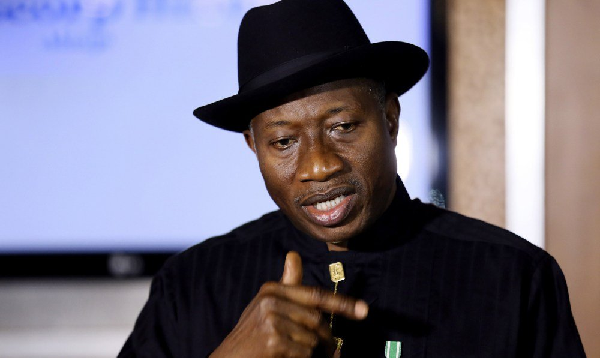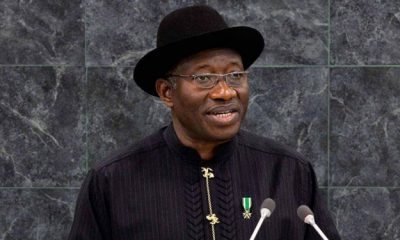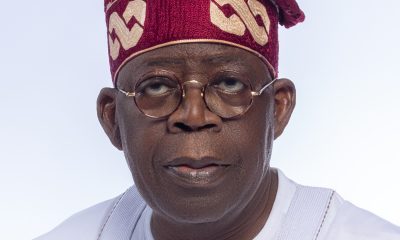Foreign News
ECOWAS Leaders Adopt Jonathan’s Recommendations on Way Forward in Mali

Leaders of the Economic Community of West African States (ECOWAS) have adopted the recommendations of its mediator in Mali and Nigeria’s former President, Dr Goodluck Jonathan, concerning the lifting of economic sanctions on the country.
in a document obtained by the News Agency of Nigeria (NAN), in Abuja, Jonathan’s six-point recommendations was adopted after his presentation to ECOWAS leaders at the 61st Ordinary Summit in Accra Ghana on Monday.
Jonathan’s recommendations were expected to pave the way for the implementation of a new 24 month transition period and the final resolution of Mali’s protracted sociopolitical crisis.
Jonathan had in a briefing last weekend recommended to the authority of Heads of State and Government to lift the economic and financial sanctions imposed on Mali.
This came after Mali’s military rulers proposed a 24-month transition to democracy to terminate in March 2024 and enacted a new law for its implementation.
In adopting the mediator’s six-point recommendations on the way forward in Mali the ECOWAS leaders in the communique issued in Accra after the 61st Ordinary Summit pronounced that the sanctions would be lifted immediately.
The outgoing ECOWAS Commission President Jean Claude Kassi Brou told a news conference in Accra that following the directive for the lifting of the sanctions, borders with Mali would be reopened and regional diplomats would return to Bamako.
Brou, however, stated that the heads of state decided to maintain individual sanctions, which targeted members of the ruling junta and the transitional council as well as the suspension of Mali from ECOWAS institutions, until the return to constitutional rule.
According to Brou, Malian authorities have taken steps in passing the electoral accord and in setting up a monitoring mechanism for transition.
He said that the authorities had also taken steps to prepare a new constitution for the country.
Jonathan who was appointment in 2020 as mediator in Mali has made frequent trips to Bamako to engage the military authorities and encourage them to initiate and successfully complete a programme of transition to democratic rule.
Just before the summit Jonathan visited the country to hold further consultations with the authorities and assess the measures already taken and their commitment to resolutely advance the process of returning the country to constitutional rule.
Some of the mediator’s six recommendations which were adopted by the leaders include recognising the steps taken by Mali towards the restoration of constitutional rule and lifting the financial and economic sanctions reimposed in January 2022.
Others include working with the international community and Mali’s development partners to extend technical, material and financial support necessary for the successful completion of the electoral process as well as welcome the steps
Johnathan, speaking at the ECOWAS 61ST ordinary summit of the authority of heads of state and government Accra, GHANA on Monday, recalled that after ECOWAS Extraordinary Summit held on 4 June, said there were clearly reflective of Mali’s commitment to decisively move forward the process of returning the country to constitutional rule with the support of ECOWAS and other partners.
Jonathan, who said that he had remained in close contact with the ECOWAS-mandated Transition Local Follow-up Committee, said that the Mali authorities briefed him on the steps they had taken since the Summit to pave the way for the organization of elections.
This according to him followed the proposal and plea that the Transition would be brought to an end by March 2024, at the latest.
“Subsequent to these consultations, additional measures were taken that consolidated the progress made.
“In this respect, I would like to highlight the adoption of the draft electoral law by the National Transitional Council (CNT) on June 17 and its promulgation on 24 June.
“It establishes the Independent Authority for the Management of Elections (AIGE), whose membership will also include representatives of political parties and civil society.
“The process for the appointment of members and operationalization of its structures at national and local levels is expected to be completed by early August.”
Jonathan disclosed that the electoral law, which is a central piece of legislation for holding elections, was widely welcomed by both the political class and the signatory movements to the 2015 Peace and Reconciliation Agreement.
“This is significant given the level of polarization that has characterized Mali’s political landscape in recent months,” Jonathan said.
He added that further legal work was planned, including on the country’s administrative reorganization, the political parties’ charter, and on equal access to the media and on the redistribution of the seats at the National Assembly.
Jonathan said that throughout the discussions, both the Transition President and the Ministers emphasized their commitment to ensure full return to constitutional rule by March 2024.
“They also expressed their expectation that, once an agreement is reached with ECOWAS, the sanctions imposed on Jan. 9, 2022 will be lifted,” Jonathan said.
He, therefore, recommended that the Summit: welcome the steps taken by Mali towards the restoration of constitutional rule and urge the Transition authorities to stay the course, keeping in mind that the Transition shall in no way extend beyond March 2024;
He also recommended the Summit agree with the proposed robust monitoring mechanism as supplemented by regular visits of the Mediator and the reactivation of the Transition Monitoring and Support Group;
“Consider lifting the financial and economic sanctions imposed on 9 January 2022, while the subsequent lifting of Mali’s suspension from ECOWAS and of the individual sanctions would be contingent upon further progress against the electoral chronogram;
“Urge the Malian authorities, building on initial steps taken, to promote consensus and inclusivity throughout the electoral and reform process and create conditions conducive to credible and transparent elections;
“Call on all of Mali’s Development Partners to extend the technical, material and financial support necessary for the successful completion of the electoral process, and request African countries from within and outside the region to contribute to the funding of the electoral process in the spirit of African solidarity;” among others(NAN)
Foreign News
Zelensky Announces New Draft Law on Anti-corruption Bodies after Protests

Ukrainian President Volodymyr Zelensky said he has approved the text of a draft law guaranteeing the freedom of two anti-corruption bodies in Ukraine – days after nationwide protests broke out over changes curbing their independence.
Kyiv’s Western partners had also expressed serious concerns over the legislation.
On Thursday, Zelensky seemed to backtrack, saying the new bill was intended to safeguard the independence of Ukraine’s National Anti-Corruption Bureau (Nabu) and Specialised Anti-Corruption Prosecutor’s Office (Sap), and to protect them from Russian influence.
He said the text of the bill was “balanced”, but did not provide any details.
The law passed earlier this week brought Nabu and Sap under the control of the prosecutor general, who is appointed by the president.
At the time Zelensky justified his decision to curtail the bodies’ powers by citing Russian influence. The day before, Ukraine’s security services had carried out searches and arrests targeting alleged Russian spies at the agency.
The passing of the legislation instantly sparked the largest protests since the start of Russia’s full-scale invasion in February 2022 in several cities across Ukraine, with many worrying the law would severely undermine the Nabu and Sap’s authority and effectiveness.
Thousands of people gathered in streets and squares across Ukraine, holding placards calling for the legislation to be vetoed.
Several commentators accused Zelensky of democratic backsliding. Their concerns were further exacerbated when Ukraine’s Western partners signalled their displeasure with the bill.
Ukraine has official EU candidate status and a spokesman for European Commission chief Ursula von der Leyen previously warned Kyiv that the rule of law and the fight against corruption were “core elements” of membership to the bloc.
On Thursday, the Commission said it “welcomed” the Ukrainian government’s decision to take action against the bill.
“We are working [with the Ukrainian government] to make sure that our concerns… are indeed taken into account,” the spokesman said.
Nabu and Sap were created in 2014-15 as one of the requirements set by the European Commission and International Monetary Fund to move towards a relaxation of visa restrictions between Ukraine and the EU.
Writing on Facebook, opposition MP Oleksiy Goncharenko noted Zelensky said that “the independence of anti-corruption institutions must be guaranteed.”
“First we take it away, and then we say that it must be guaranteed. So why was all this necessary?”
In his message on social media on Thursday, Zelensky did not acknowledge the protests or the backlash but said it was “important that we respect the position of all Ukrainians and are grateful to everyone who stands with Ukraine.”
Foreign News
US Senators Exempt HIV/Aids Funding from Planned Spending Cuts

Republicans in the US Senate have said they will spare the US-backed HIV/Aids programme Pepfar from cuts, amid a larger effort to reduce government spending.
Senators said they would end a plan to cut $400m (£300m) from the President’s Emergency Plan for Aids Relief programme, leaving total proposed cuts at $9bn.
The proposition was made in a Senate amendment to a rescissions package – meaning a bill that allows lawmakers to cancel previous funding approved by Congress.
The planned cancellations also include funds for international aid and public broadcasting.If the Pepfar amendment is approved, the bill will go back to the House of Representatives for another vote ahead of a Friday deadline.
Multiple senators from both parties had expressed concern with cuts to Pepfar, which was launched under President George W Bush and has been credited with saving tens of millions of lives around the world.
The Republican-controlled Senate can only afford a few defectors, assuming all Democrats vote in opposition. John Thune, the Republican Senate majority leader, said there had been a “lot of interest” in keeping the Pepfar funding intact.
Senator Susan Collins, a Republican from Maine, told reporters after a White House lunch on Tuesday that she was “very pleased” that the cuts would be removed.
Prior to the amendment, Collins had been vocal against the bill. She has not said whether the changes are enough to secure her support.
Office of Management and Budget (OMB) Director Russell Vought told reporters that the White House was on board with the Senate amendment, meaning that in its current form President Donald Trump would be willing to sign it.
In his second presidency, Trump has turbo-charged an effort to reduce government spending. Most of the cuts in the rescission bill are aimed at clawing back money that was previously earmarked for the American government’s main humanitarian assistance body, USAID, which recently announced its formal closure under Trump.
Trump’s moves have led to drastic reductions in HIV/Aids clinics in South Africa and other countries, precipitating a shortage of life-saving medicine and care.
Other cuts in the rescission bill are aimed at the funding for public broadcasters NPR and PBS.
Foreign News
WHO Commends Senegal for Eliminating Trachoma

The World Health Organization (WHO) has validated Senegal’s elimination of trachoma as a public health problem, making it the ninth country in WHO’s African Region to have achieved the feat.
WHO Director-General Tedros Ghebreyesus, in a statement, lauded the country for freeing its population of the disease.
“This milestone is yet another sign of the remarkable progress being made against neglected tropical diseases globally, and offers hope to other countries still working to eliminate trachoma.
”Trachoma has been known in Senegal since the early 1900s and was confirmed as a major cause of blindness through surveys in the 1980s and 1990s.
Senegal joined the WHO Alliance for the Global Elimination of Trachoma in 1998, conducted its first national survey in 2000, and completed full disease mapping by 2017 with support from the Global Trachoma Mapping Project and Tropical Data.
Trachoma control was consistently integrated into national eye health programmes – first under the National Programme for Blindness Prevention (PNLC) and later through the National Programme for the Promotion of Eye Health (PNPSO).
The country’s consistent integration of trachoma control into its national eye health programmes positioned it to significantly maintain its commitment to the elimination of the disease.
“Today we celebrate our victory against trachoma, 21 years after the one against dracunculiasis”, Dr Ibrahima Sy, Senegal’s Minister of Health and Social Action, said.
“This new milestone reminds us that our overarching goal remains a Senegal free from neglected tropical diseases.
“We are fully committed to this, and we are making good progress, notably against human African trypanosomiasis (sleeping sickness) and onchocerciasis”.
Senegal implemented the WHO-recommended SAFE strategy to eliminate trachoma with the support of partners, reaching 2.8 million people who needed them across 24 districts.
These activities included the provision of surgery to treat the late blinding stage of the disease and conducting antibiotic mass drug administration of azithromycin donated by Pfizer through the International Trachoma Initiative.
Similarly, public awareness campaigns were carried out to promote facial cleanliness and improvement in access to water supply and sanitation.
Trachoma is the second neglected tropical disease to be eliminated in Senegal. In 2004, the country was certified free of dracunculiasis (Guinea-worm disease) transmission.
Senegal now joins 24 other countries that have been validated by WHO for eliminating trachoma.
The 24 countries are Benin, Burundi, Cambodia, China, Gambia, Islamic Republic of Iran, Lao People’s Democratic Republic, Ghana, India, Iraq, Malawi, and Mali.
The others are Mauritania, Mexico, Morocco, Myanmar, Nepal, Oman, Pakistan, Papua New Guinea, Saudi Arabia, Togo, Vanuatu, and Vietnam.
These countries are part of a wider group of 57 countries that have eliminated one or more neglected tropical diseases.
WHO is supporting Senegal’s health authorities to closely monitor communities in which trachoma was previously endemic, to ensure there is no resurgence of the disease.
“Trachoma has cast a shadow over communities in Senegal for more than a century.
“This long-awaited validation is not only a milestone for public health but a powerful tribute to the tireless dedication of frontline health workers, communities, government leaders, and partners who never gave up,” Dr. Jean-Marie Vianny Yameogo, WHO Representative in Senegal, said.
“Today, we close a chapter that began over a hundred years ago, united with pride, gratitude and resolve. WHO remains committed to supporting Senegal as the country continues to lead in sustaining this hard-earned achievement.”
Trachoma remains a public health problem in 32 countries, with an estimated 103 million people living in areas requiring interventions against the disease.
Trachoma is found mainly in the poorest and most rural areas of Africa, Central and South America, Asia, the Western Pacific and the Middle East.
WHO’s African Region is disproportionately affected by trachoma, with 93 million people living in at-risk areas in April 2024, representing 90% of the global trachoma burden.
Significant progress has been made in the fight against trachoma over the past few years, and the number of people requiring antibiotic treatment for trachoma in the African Region fell by 96 million from 189 million in 2014 to 93 million as of April 2024, representing a 51 percent reduction.
There are currently 20 countries in WHO’s African Region that are known to require intervention for trachoma elimination.
They are Algeria, Angola, Burkina Faso, Cameroon, Central Africa Republic, Chad, Côte d’Ivoire, Democratic Republic of the Congo, Eritrea, Ethiopia, and Guinea.
The others are Kenya, Mozambique, Niger, Nigeria, South Sudan, the United Republic of Tanzania, Uganda, Zambia, and Zimbabwe.
A further 3 countries in the Region (Botswana, Guinea-Bissau and Namibia) claim to have achieved the prevalence targets for elimination.































